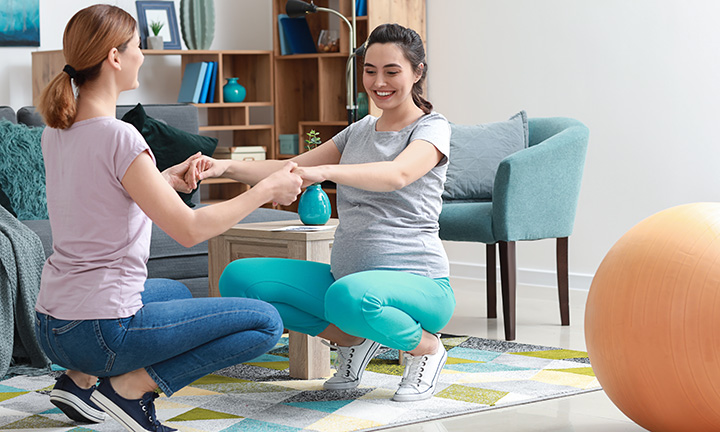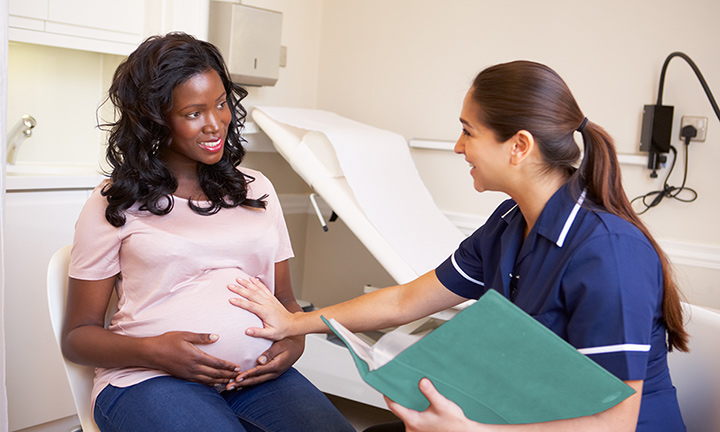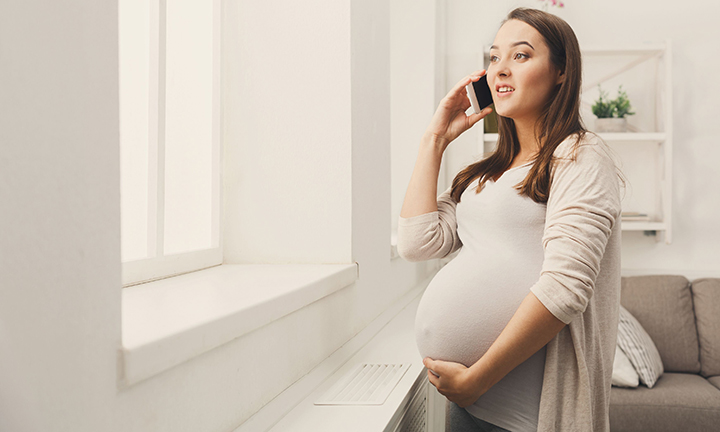
What Do Contractions Feel Like?
You might sometimes feel a tightening or cramping in your stomach and wonder: Is this it? Am I going into labour?
It might be difficult to tell at first, especially if this is your first time having a baby, but it helps if you know what to look out for.
Here, we'll help you with that by describing what contractions can feel like, and how Braxton Hicks ‘practice' contractions might feel compared to the real deal, which are sometimes called true labour contractions.
We'll also provide some tips on how to manage the pain, and when to call your midwife or doctor.
The Different Names for Contractions
You might hear these terms used for different types of contractions. Here's a brief rundown of what they mean:
What Do Braxton Hicks Contractions Feel Like?
Braxton Hicks contractions can feel like a tightening that starts from the top of your bump and spreads downwards through your tummy.
This feeling is caused by a mild tensing of the muscles in your uterus, and it can last for around 30 to 60 seconds before the muscles relax again.
Braxton Hicks contractions aren't usually painful, but the feeling of tightness can be uncomfortable. The intensity of these contractions may ebb and flow — for example, they could feel weaker, then stronger, then weaker again.
Practice contractions are normal and expected — they're your body's way of getting ready for what's to come.
They can happen at any time, but can also be triggered by physical exertion, during sex, or even when someone just touches your bump.
If you don't experience them, that's fine too. Some mums-to-be never get Braxton Hicks contractions at all, while others start feeling them from the second or third trimester of pregnancy.
If you do have them, they may come as often as several times in an hour, or just a few times a day or week.
To relieve the discomfort of Braxton Hicks contractions, try walking around, taking a bath, lying down or changing positions.
Staying hydrated is believed to help make Braxton Hicks contractions less likely to occur, so keep drinking plenty of water.
If you're unsure about whether you're experiencing Braxton Hicks contractions or true labour contractions, ask your midwife or doctor for advice.
What Do Early Labour Contractions Feel Like?
It's difficult to predict or describe what real labour contractions will feel like for you. This is partly because everyone's experience of pain is different.
For you, labour contractions may feel quite mild, or they may feel very strong and intense. For some mums-to-be, they feel like extreme period pains.
Unlike the ebb and flow of Braxton Hicks, true labour contractions feel steadily more intense over time. During true labour contractions, you'll feel your belly tightening and becoming very hard while the contraction lasts, then the pain will subside as the muscles relax again.
Another sign that your contractions are the real thing is that they don't go away when you change position, take a bath or go for a walk.
Keep in mind that, in the very early stages of labour, your contractions may start and stop. It's also possible for them to continue for a long time without getting longer or more intense.
This is perfectly normal, so don't worry. In fact, it's a good idea to use any breaks in the pattern of contractions to get some rest or have something to eat.
If you do have a snack, eating slow-release carbohydrates, like brown bread or brown pasta, will help boost your energy reserves for a little longer.
Of course, if you're in any doubt about what you're experiencing, or if you're still unsure what your labour contractions should feel like, check with your midwife or doctor. He or she will probably ask you some questions, and then advise you to either stay home and relax for a little longer, see your doctor for a check-up, or grab your hospital bag and get to the hospital or birthing centre.
Timing Your Contractions
An important difference between Braxton Hicks and true labour contractions is that real labour contractions come at regular intervals and get closer together in time.
That's why it can help to time your contractions. Besides helping you decide whether your contractions are the real thing, it's also a good way of determining when to leave for the hospital or birthing centre.
Your midwife or doctor will advise you on how to do this when the time comes, but as a rule of thumb it's time to get going when your contractions are coming at 4 to 5-minute intervals, and are lasting for around 60 seconds.
If you don't live close to the hospital, you may need to leave earlier to allow some extra time for getting there.
Other Signs of Labour to Look Out For
Another tell-tale sign that you're feeling real contractions is the presence of other early signs of labour.
Some of these symptoms may be obvious, but others less so. Signs that your labour is starting might include:
How Can You Manage the Pain of Labour Contractions?
To help manage the pain of those early labour contractions, you could try:
As your labour progresses, contractions can feel more painful. It's a good idea to discuss your options for comfort measures during labour with your midwife or doctor ahead of time.
It's also a good idea to discuss these with your birth partner or your doula, if you have one.
For example, some mums-to-be choose pain medication, like an epidural. Others opt for non-medical forms of relief, like hypnobirthing. Some consider a combination of several different methods.
Pain management is a very personal process and choice. You might even change your mind about what you'd like as your labour progresses, and this is fine.
Keep an open mind and don't be shy about talking to your midwife or doctor about what you might like to have and what's available to you.
What's your take? Try our labour pain relief quiz to tell us more and find out what other mums-to-be are saying.
FREQUENTLY ASKED QUESTIONS
It's natural to feel nervous about what those first contractions will feel like and whether you'll know when labour has really begun.
Remember, your midwife and doctor are there to help you know when the time has come and what to do then.
It might help to keep in mind that despite the pain and discomfort you might feel, those early Braxton Hicks contractions are helping your body prepare for labour, and each true labour contraction is helping to dilate your cervix and push your baby a little further down into your pelvis.
It's been a long and eventful journey since you first found out you were pregnant, and now you've nearly arrived at your destination – this is the moment you've been working towards and waiting for.
Your first true labour contractions are a sure sign that it won't be long before you finally get to cradle your newborn in your arms, and everything will have been worth it!
- National Health Service: Week 33 – your third trimester
- National Health Service: What happens during labour and birth
- National Health Service: You and your baby at 40 weeks pregnant
- National Health Service: There are three stages of labour
- National Health Service: The latent phase of labour
- National Health Service: Week 31 – your third trimester
- National Health Service: Sex in pregnancy
- National Health Service: Coping methods and options for pain relief in labour
- St Marks Medical Centre: Signs that labour has begunδ
- National Health Care: What to expect in the early stage of labour
Read more about Pregnancy
Related Articles
Join Pampers Club and get:














